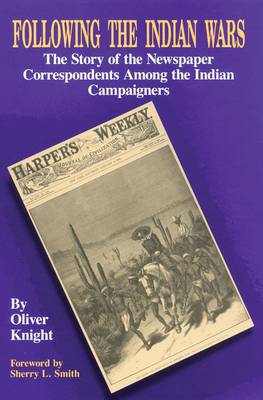
- Retrait gratuit dans votre magasin Club
- 7.000.000 titres dans notre catalogue
- Payer en toute sécurité
- Toujours un magasin près de chez vous
- Retrait gratuit dans votre magasin Club
- 7.000.000 titres dans notre catalogue
- Payer en toute sécurité
- Toujours un magasin près de chez vous
Following the Indian Wars
The Story of the Newspaper Correspondents Among the Indian Campaigners
Oliver KnightDescription
Historians and military men have had their say about the Indian wars, which lasted from 1866 to 1891. But the newspaper correspondents who took to the field with troops now get their innings--if not the last word. And what they have to say, as revealed by Oliver Knight, himself a former newspaperman, sheds new and important light on twenty-five years of conflict extending over half a continent.
Using a huge canvas, the author deploys the historical facts about more than one thousand fights between troops and Indians, the immediate, first-hand impressions of correspondents who participated in the battles and skirmishes, and his own interpretations from the combined evidence. It is as if the reader himself had gone along on these expeditions, to see what was happening, to assess the relative skill of commanders and their troops, and to share both the dangers and the relaxations of military life on the vast frontier beyond the Mississippi.
The correspondents were new men, not the old Civil War hands, following troops that, in the years to come, were to be called "Old Army." Frank, uninhibited, and, above all, daring, they knew what the fighting was about, for they were in it, members of an unsupported military element far advanced into hostile territory.
Their adventures are related in the twelve major campaigns of the period, ranging from the Southern Plains to the Sioux country, and from Colorado to California, and involving tribes as various as the Kiowas, Comanches, Sioux, Modocs, Utes, Cheyennes (both Northern and Southern), Apaches, Bannocks, and Nez Percés.
Spécifications
Parties prenantes
- Auteur(s) :
- Editeur:
Contenu
- Nombre de pages :
- 382
- Langue:
- Anglais
Caractéristiques
- EAN:
- 9780806125084
- Date de parution :
- 15-03-93
- Format:
- Livre broché
- Format numérique:
- Trade paperback (VS)
- Dimensions :
- 151 mm x 230 mm
- Poids :
- 616 g







